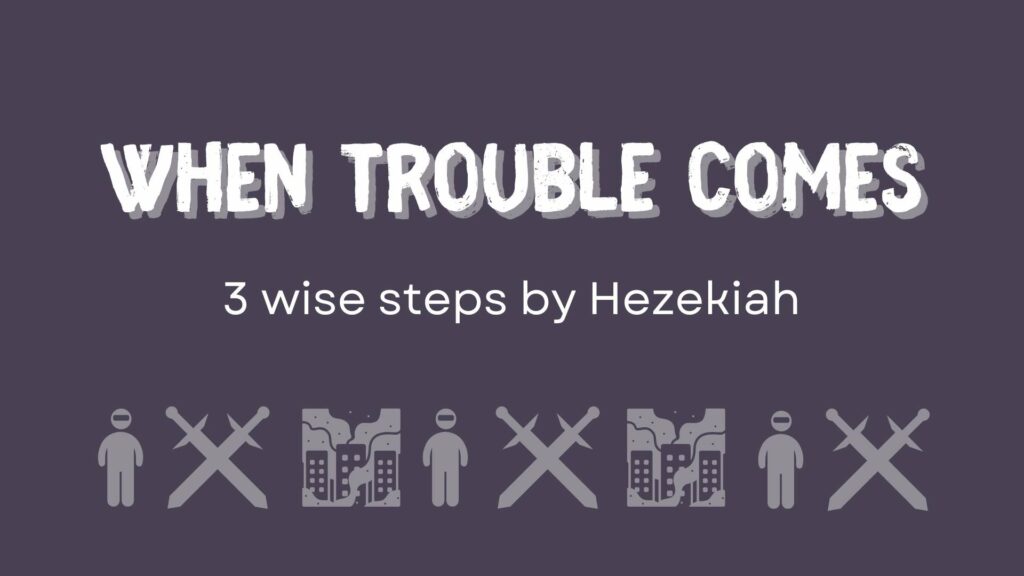3 Steps When Trouble Comes
Written by Brian Jennings, Posted in Blog, Lead Yourself
What do you do when trouble comes? When a relationship gets wobbly? When a job feels insecure? When your budget won’t balance?
When the most brutal, menacing army of Assyria showed up on King Hezekiah’s doorstep, trouble had fully arrived. We can learn a ton from this encounter.
“In the fourteenth year of King Hezekiah’s reign, King Sennacherib of Assyria came to attack the fortified towns of Judah and conquered them. Then the king of Assyria sent his chief of staff from Lachish with a huge army to confront King Hezekiah in Jerusalem” (Isaiah 36:1-2).
King Sennacherib and his officials brag about their conquests, mock the “tiny army” in Jerusalem, threaten to starve them out of their city (saying Jerusalem will be left eating their own dung and drinking their own urine), and gather an army ready to crush the city.
He ends his threats with the thrust of his message: “So what makes you think that the Lord can rescue Jerusalem from me?”
Now that is some big talk!
Trouble came to Hezekiah. Look what he does, and learn what we can do too.
“When King Hezekiah heard their report, he tore his clothes and put on burlap and went into the Temple of the Lord… After Hezekiah received the letter from the messengers and read it, he went up to the Lord’s Temple and spread it out before the Lord” (37:1,14).
1-Go to the Lord.
You could go lots of places. You could try to run away like Jonah. You could run to bad or unhelpful people without Godly direction. You could slink into a bar and try to numb your pain. Instead, go to the Lord.
Hezekiah had some resources, some fighters, some counsel, some other countries that might support him, and some weapons. But none of these resources are what he really needed.
Prayer was the most powerful tool in Hezekiah’s arsenal.
I’m not sure what trouble is standing on your doorstep today, but we know exactly where you should first go. Go to the Lord.
2-Acknowledge the problem.
Have you ever entered a crisis and heard, “Don’t worry, it will all be fine”? Is anything less helpful?
Pretending a problem doesn’t exist is not a sign of great faith. It only demonstrates that someone has lost touch with reality.
Hezekiah accepted the massive trouble at his door. He wept. He plunged into the problem and the accompanying emotions.
Verse 14 says he spread out the threatening letter. I love this. Seeing a physical representation of our trouble helps us fully engage into our crisis. Have you ever laid an unpaid bill on your table? Have you ever clutched the picture of a loved one you don’t know how you’ll exist without?
God answers Hezekiah succinctly: “Do not be disturbed by this blasphemous speech against me from the Assyrian king’s messengers. Listen! I myself will move against him…I will have him killed with a sword” (37:6-7).
God hears Hezekiah’s problem and responds.
3-Remember what God has done
“And Hezekiah prayed this prayer before the Lord: “O Lord of Heaven’s Armies, God of Israel, you are enthroned between the mighty cherubim! You alone are God of all the kingdoms of the earth. You alone created the heavens and the earth” (37:15-16).
When trouble comes sometimes we immediately remember all of the other trouble that’s come in our lives, or we envision a future without help. Instead, we can remember what God has already done in this world and in our lives. When we meditate on these things, our perspective drastically changes.
The story ends with two acts: God tells the Assyrian king that he knows of his unending boastfulness, he knows where he lives, and he’s coming for him. Yikes!
Then God’s words come true. An angel decimates his army, he retreats back home, and later while worshiping his false god, two of his sons strike him down.
God crushed Hezekiah’s trouble into dust. Can he do the same for you?
Your trouble will be different. The way God responds will be different. God may allow trouble to mold you. Your trouble may advance the Gospel in the lives of others. Your trouble may last longer than you want. All of this may be true, but God can still be trusted.
Feel free to doubt your bank account, your troubled friendship, and your shaky job situation. Doubt them all you want, but don’t doubt God’s ability to help you in your trouble.
To doubt God is to trust someone or something else.
“Trust in the Lord with all your heart and lean not on your own understanding; in all your ways acknowledge him and he will make your paths straight. Do not be wise in your own eyes; fear the Lord and shun evil” (Proverbs 3:5-7).
Trust God when trouble arrives:
1-Go to the Lord.
2-Acknowledge the problem.
3-Remember what God has done.
Would you take a moment to reflect on the following:
- Which of the three steps Hezekiah took is most difficult for you?
- Read Psalm 55. Note how the Psalmist takes these three steps.
- List one or more of your troubles, then follow Hezekiah’s steps.
*If you like archeology, look up “Sennacherib’s Prism.” Note how he brags about trapping Hezekiah “like a bird in a cage,” but doesn’t claim to actually conquer Jerusalem. That’s some clever propaganda. He tells the truth, but neglects to finish the story.





